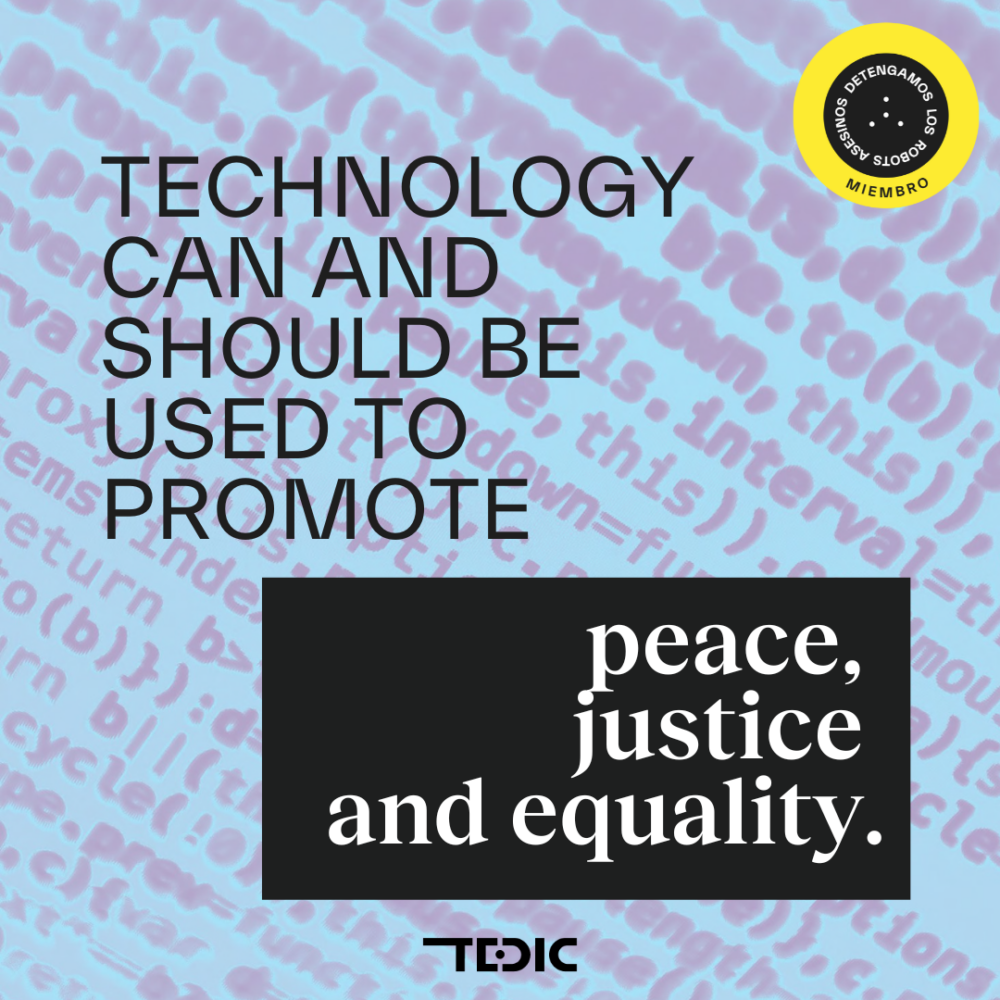
In February 2024, the UN sent a letter to states and civil society organizations requesting their comments on lethal autonomous weapon systems, known as “killer robots.” The letter sought to address the challenges and concerns from humanitarian, legal, security, technological and ethical perspectives, in preparation for the 79th session of the UN General Assembly in September this year.
In a joint effort to raise awareness and mobilize society about digital dehumanization and the increasing development of killer robots, TEDIC held significant meetings with two sectors: other civil society organizations and Paraguayan state institutions. The goal of both meetings was to discuss and subsequently issue a statement addressing the challenges posed by autonomous weapon systems in response to the UN’s request. Additionally, along with these positioning efforts by organizations and the Paraguayan State, we participated in international events on the subject matter and obtained the first parliamentary commitment on the issue.
Spaces for advocacy with civil society and the Paraguayan State
At the beginning of March we led a meeting with different civil society organizations within the framework of the international campaign “Stop Killer Robots”. In this meeting we discussed the implications of autonomous weapons systems in the national and international context and addressed the necessity for a joint statement on the urgent need to regulate them.
Participants in this meeting included organizations such as Amnesty International Paraguay, the Human Rights Coordinator of Paraguay (CODEHUPY), Heñói Center for the Study and Promotion of Democracy, Human Rights and Socio-environmental Sustainability, the Vencer Foundation, Semillas para la Democracia, and the organization Tape’a for a sustainable social development.
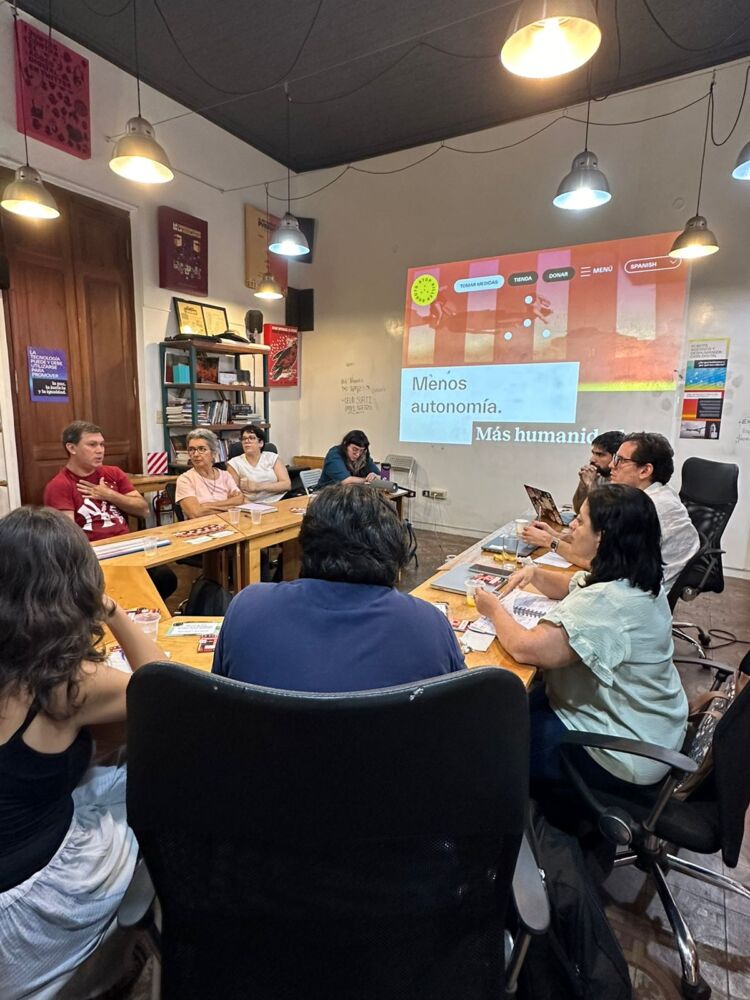
On the other hand, TEDIC has been working closely with key actors of the Paraguayan State to promote an informed and constructive dialogue regarding the social and ethical impacts of the technology used for defense. These articulations aim to influence public policy formation and ensure that Paraguay can effectively contribute to international debates with a well-founded and ethically sound position on autonomous weapons systems.
In this regard, we held meetings with various public institutions between February and March of this year to make them aware of the UN letter and extend the invitation to a joint working group involving TEDIC, the National Defense Council, the Ministry of National Defense, the Ministry of Foreign Affairs, the Science and Technology Commission of the Chamber of Deputies and the Science, Technology, Innovation and Future Commission of the Chamber of Senators of the National Congress.
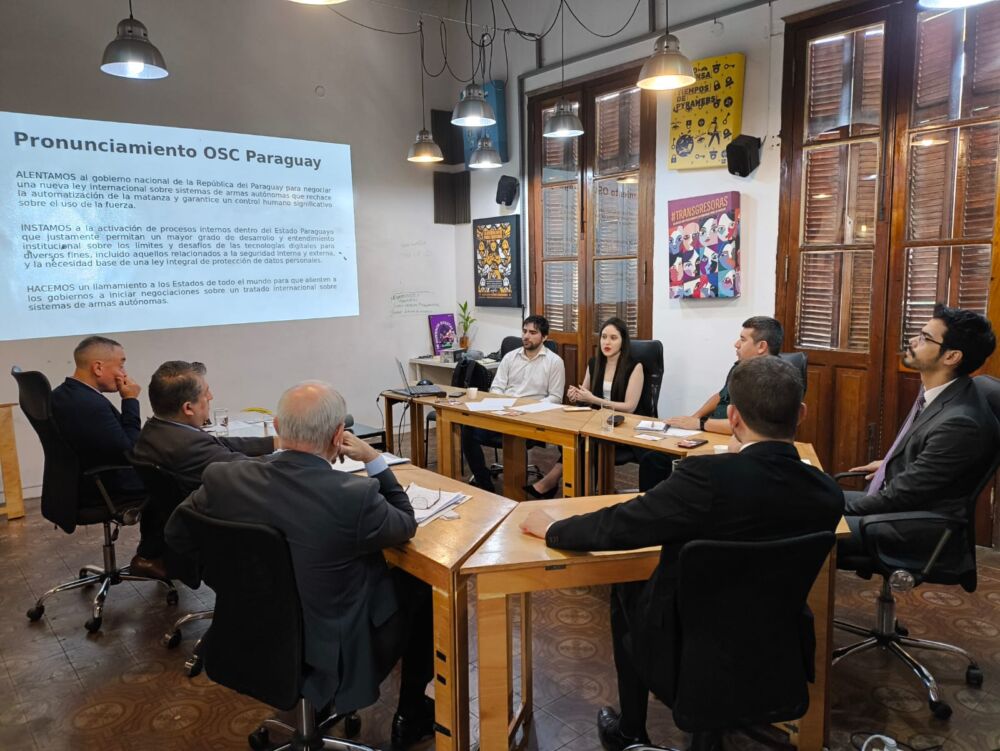
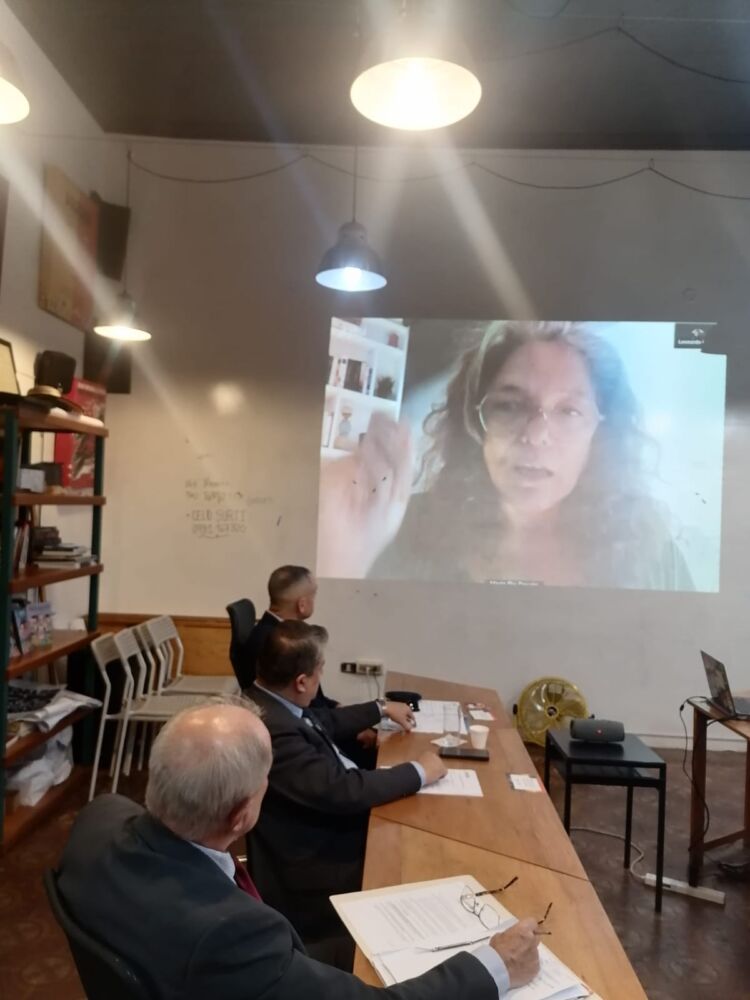
Image of María Pía Devoto’s virtual participation in the meeting – April 10
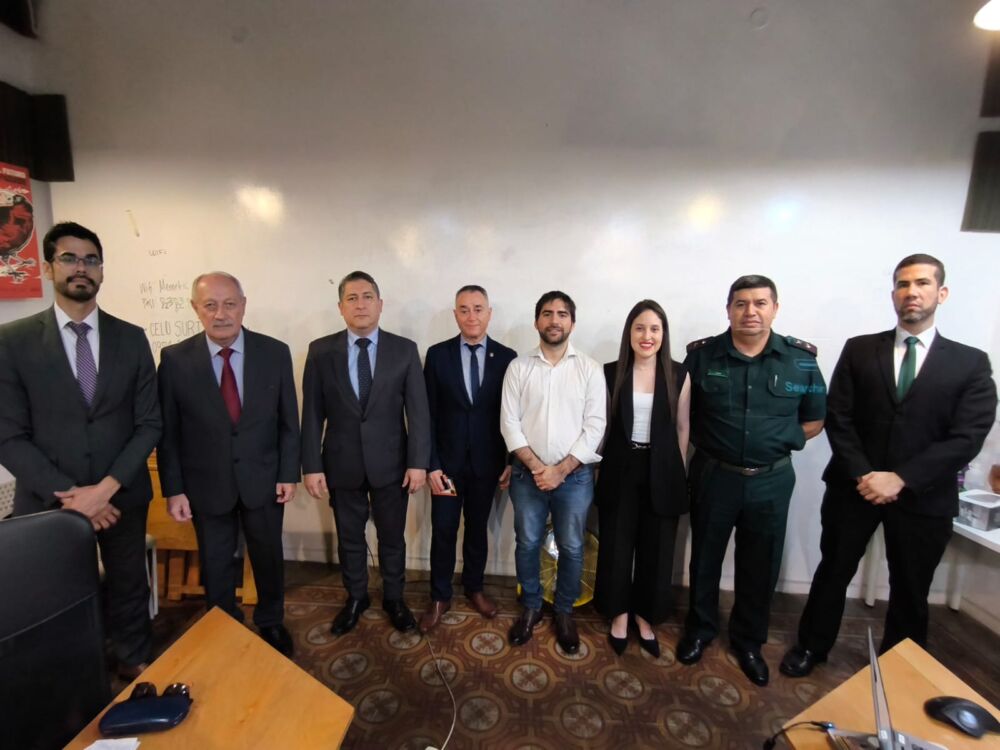
Participation of representatives of Paraguayan State institutions in the meeting – April 10th
In this working group, alongside different public institutions of the State, we had the virtual participation of expert María Pía Devoto, Coordinator of the Latin America Human Security Network (SEHLAC). Her contribution during the meeting laid the groundwork for the current debate on autonomous weapons systems, providing state representatives with an expert insight into the ethical and social challenges we face in the digital age, emphasizing the importance of Paraguay’s role in the global debate on the use and regulation of autonomous weapons.
Civil society statement in Paraguay
In April, we presented to the UN the Paraguay’s civil society statement, crafted jointly during the meetings held in March. This statement, entitled “Stop Digital Dehumanization: We urge Paraguay and UN member states to strictly regulate autonomous weapons”, has the support of all the organizations that were present and participated in our working groups. You can read the statement here.
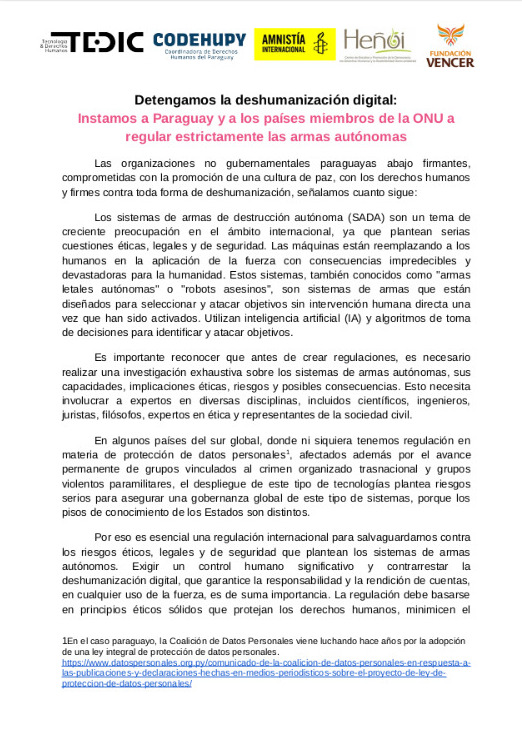
The resolution points of the statement are as follows:
- WE ENCOURAGE the Paraguayan State to negotiate a binding international instrument on autonomous weapons systems that rejects the automation of killing and guarantees meaningful human control over the use of force.
- WE URGE the activation of internal processes within the Paraguayan State that allow for a greater degree of development and institutional understanding of the limits and challenges of digital technologies for various purposes, including those related to internal and external security, and the fundamental need for a comprehensive law on personal data protection.
- WE CALL ON States around the world to encourage governments to initiate negotiations on an international treaty on autonomous weapons systems.
Paraguay’s first parliamentary commitment
As a result of close collaboration with representatives of the Paraguayan State, deputies Rodrigo Blanco and Marcelo Salinas participated in the 148ª Assembly of the Inter-Parliamentary Union in Geneva where these concerns were discussed. In this regard, the Assembly adopted resolutions on the impact of autonomous weapons and artificial intelligence, urging national legislations to regulate their development.
It is also worth noting that Deputy Raúl Benítez became the first Paraguayan parliamentarian to sign the Parliamentary Commitment of the Stop Killer Robots campaign, pledging to support the government in negotiating a new international law on autonomous weapons systems that rejects the automation of killing and ensures meaningful human control over the use of force.
At TEDIC, we celebrate Paraguay’s first parliamentary commitment and see it as a crucial step in reaffirming our commitment to building a future where technology is developed in a responsible manner that respects human rights.
TEDIC and the Paraguayan State discuss the regulation of autonomous weapons in Vienna
At the end of April, along with a Paraguayan delegation composed of state representatives and members of TEDIC, we actively participated in two important events in Vienna focused on the future and regulation of autonomous weapons.
In the first event, the forum “Action at the Crossroads: Civil Society Forum on Autonomous Weapons and the Challenge of Regulation”, Leonardo Gómez, projects coordinator for democracy and technopolitics, represented TEDIC in a panel called “Fusing art and activism”. In this forum we shared our exhibition “Re(x)sistentes to digital dehumanization” highlighting the role of artistic exhibitions and other creative media in promoting education for disarmament and peace. During this event, we also socialized the statement issued by Paraguay’s civil society.

.
In addition, we participated in the main event, “Humanity at the Crossroads: Autonomous Weapons Systems and the Challenge of Regulation”, organized by the Austrian Federal Ministry for European and International Affairs. This event brought together member states, representatives of the UN, the International Red Cross, and various international organizations. Debates ranged from the legal and ethical implications to the humanitarian and security consequences posed by the increasing autonomy in weapons through artificial intelligence. At this stage of the event, we participated as representatives of Paraguayan civil society together with Admiral Cíbar Benítez, Minister of the National Defense Council (CODENA) and representatives of the Permanent Mission of Paraguay in Vienna.
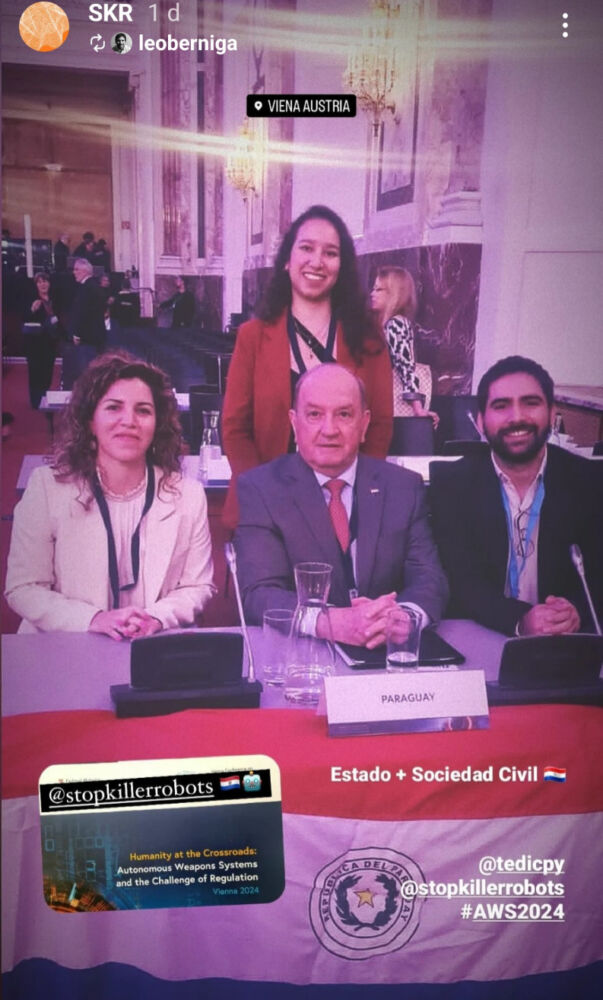
These debates come at a crucial time, following the recent request from the UN Secretary General urging member states to consider the challenges that autonomous weapons pose to global society. This call echoes previous United Nations General Assembly resolutions, where an overwhelming majority of states emphasized the urgency of addressing these issues.
At TEDIC, we urge these debates to serve as a call to ban autonomous weapons systems and ensure their regulation at both national and global level. These actions highlight the importance that technological advancement must always go hand in hand with ethics, humanity and the protection of our human rights.

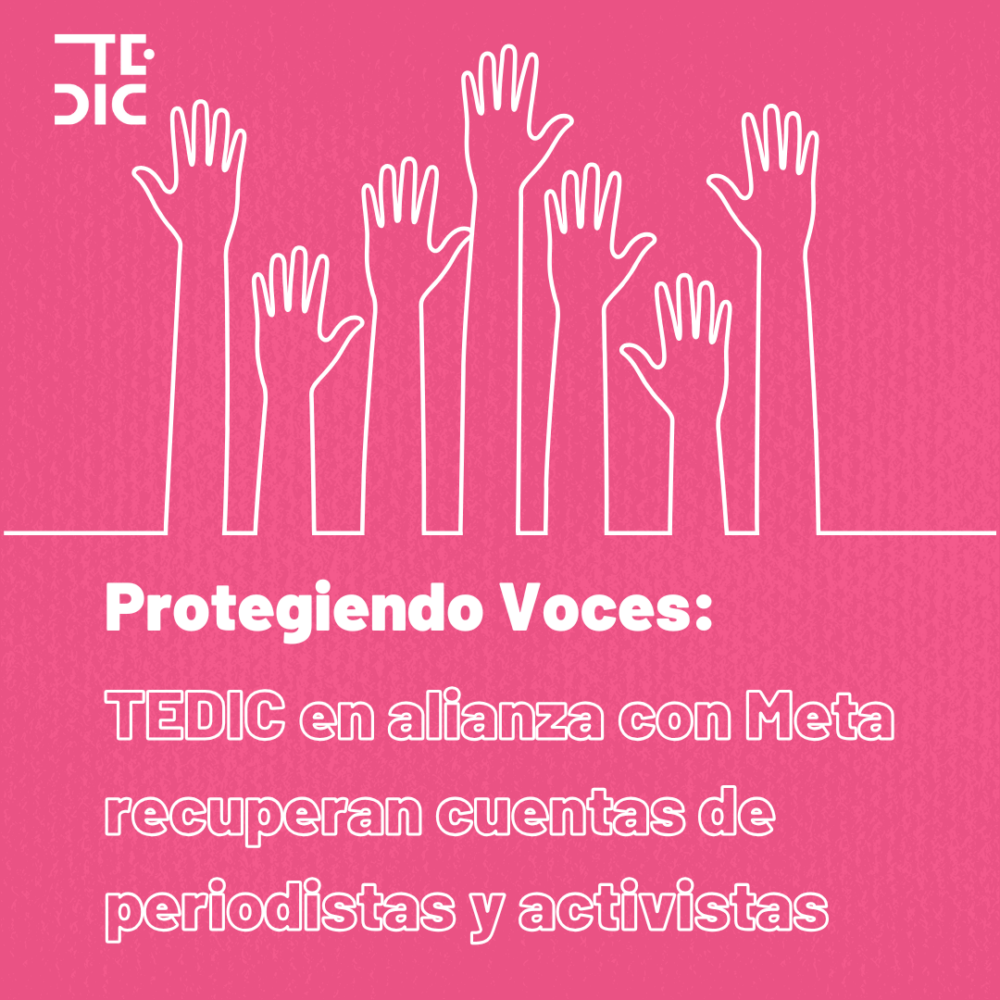 Defending those who defend us
Defending those who defend us